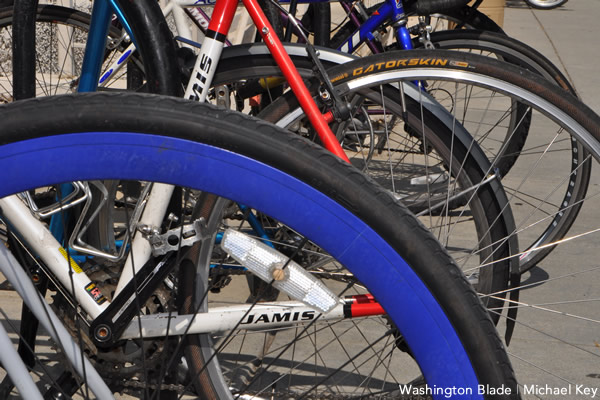Commentary
Let some air out of the trend-tired ‘cult of the bike’
Drivers, bikers, walkers, riders, businesses share same small streets


It’s time for bikers to make the transition from roadway rebel to responsibly sharing the same small streets. (Washington Blade photo by Michael Key)
What is it about D.C. and bicyclists?
Maybe the nation’s capital really is a hometown for “third-rail” topics. Do we fight-to-the-death our nonsensical pitched battles and relentlessly defend external cultural signifiers because we live at the national ground zero for identity politics?
One can almost imagine the pre-arrival dialogue between two partners on the way to a dinner party: “Now, remember, don’t ask John about his job that he lost two weeks ago, Susan is no longer pregnant and, please, don’t tell that story about almost hitting that guy on the bike who swerved in front of you on the way home last week. You know how sensitive Robert is about bike lanes.”
Regardless of the cause or reason, Washingtonians have become entirely too agitated about bicycle anxiety — both those who ride them and those who don’t.
In recent years, and during local political campaigns, bikes have even become symbolic proxy for the many demographic upheavals and economic tidal waves crisscrossing the city. Well, along with dog parks, that is.
Last week the city had another one of its periodic explosions of hot tire air. Prompted by a provocative and partly tongue-in-cheek, over-the-top opinion piece by Washington Post columnist Courtland Milloy, hatin’ was hurlin’ fast and furious. It followed a somewhat scolding transportation column by colleague John Kelly reminding bicyclists of the riding-on-sidewalks prohibition in the downtown commercial area and pedestrian angst over violations.
There were quick calls for the newspaper to fire longtime columnist Milloy. (Really? Yes, really.) The famously near-universality of biking aficionados among bloggers and alternative media reporters fueled some of that, but it was a road we’d all been down before. No one needed a street map to know where we were headed.
Soon a “protest ride” from Dupont Circle to the Post’s offices was announced, drawing approximately 40 bikers, to demand that Milloy engage in “dialogue” on the matter. Television crews interviewed smug bicyclists miming that oh-so-trendy and despicable retort to “disagreeable” opinions – referring to them as “unacceptable words” and “unacceptable thinking.” One imagined a lurking “hate speech” allegation.
We are talking about bicycles, people, only bikes. Those slender self-powered metal objects utilized for transport and that many worldwide, especially the poor and low-skill workers in many places, use to get to and from jobs and tasks. While D.C. has a relatively robust bike riding and sharing rate among U.S. cities, it’s possible to count on fingers and toes the number you’re likely to see pedaling to work and home each day on a commute by foot, bus, subway, taxi or car. A near-negligible percentage of residents use a bike as a commuting or transit method.
Yes, D.C. is a wonderfully “walkable, livable” and “bike-able” place with a full array of transportation options. I’ve lived in Washington for more than three decades and have never owned a car.
Bicyclists need to release some air out of their tires. I suspect they may be clueless how irksome many perceive the tiresome whining that biker desires are not being met, there aren’t enough dedicated bike lanes, they’re inadequately lauded as environmental angels, they shouldn’t be subject to common courtesies or city rules.
It’s time for bikers to make the transition from roadway rebel to responsibly sharing the same small streets. It won’t be easy, alongside all the cars, taxis, buses, someday-streetcars, pedestrians, business delivery trucks and other vehicles crammed on the city’s narrow thoroughfares. It is dangerous out there.
Let’s also try to remember that this is not one of D.C.’s most pressing problems. In a now only-pseudo-booming city teetering on the edge of a metropolitan area recession where housing costs are skyrocketing, job creation is halting, homeless people are languishing in a morass of misery despite wildly out-of-control service costs due to government mismanagement, hyper-sensitive two-wheel drama reads ridiculous.
Let’s keep that in mind while we finally start acting adult about accommodating mutual access and shared usage.
Mark Lee is a long-time entrepreneur and community business advocate. Follow on Twitter: @MarkLeeDC. Reach him at [email protected].
Commentary
America’s detransition: The far-right’s coordinated attack on climate policy and trans rights
Progress framed as ‘mistake that must be undone’

What if the far-right’s endgame isn’t just stopping progress, but erasing it altogether? From banning trans healthcare to reversing climate policies, they aren’t just resisting change — they’re trying to force the world back into an imaginary past that never existed.
Across climate policy and trans rights, the right isn’t just opposing change — it’s actively detransitioning America, unraveling progress under the guise of “common sense” and “restoring order.” But this isn’t just about ideology. It’s about power.
From pulling out of the Paris Agreement to banning gender-affirming healthcare, the right has perfected a political strategy that frames progress as a mistake that must be undone. Whether it’s climate action or trans visibility, any step toward justice is framed as dangerous, unnatural, and in need of correction.
And if we look closer, these attacks aren’t just similar — they are deeply connected. By comparing the right’s climate rollbacks and its war on trans rights, we can see a broader strategy at work: One that fuels fear, manufactures doubt, and ultimately serves the interests of those already in control.
The fight isn’t just about policy. It’s about who gets to belong in the future.
The manufactured crisis: Who profits from reversal?
To justify rolling back both trans rights and climate protections, the right leans on manufactured crises — presenting change as a dangerous social experiment gone wrong. And the most effective way to do that? Weaponizing doubt.
Take climate change. Despite overwhelming scientific consensus, climate denialists cherry-pick uncertainties — using rare instances of changing climate models to cast doubt on the entire field.
Similarly, the right has latched onto detransition stories, amplifying a handful of cases where individuals regret transitioning to suggest that all trans people will regret their identities.
By focusing on individual regret rather than systemic realities, these movements create the illusion that climate action and trans healthcare are harmful mistakes rather than necessary progress. The message is clear: We must “correct” these wrongs by detransitioning the country back to a time before this supposed damage occurred.
But who actually benefits from this rollback?
- Fossil fuel companies profit from climate skepticism, ensuring we remain dependent on dirty energy.
- Right-wing politicians fundraise off anti-trans fearmongering while avoiding economic issues that might actually improve people’s lives.
By making people believe they are “fighting back” against elites, the right obscures the actual elites profiting from this manufactured outrage.
The spectacle: Turning trans lives and climate policy into distractions
None of this would work without media spectacle. Right-wing politicians and media outlets know that the most effective way to keep people from questioning power is to keep them emotionally invested in a performance.
Take the far right’s obsession with trans youth. They flood the airwaves with panic over puberty blockers, despite the fact that gender-affirming care is exceedingly rare.
A peer-reviewed study analyzing private insurance claims found that out of more than 5 million adolescents ages 8 to 17, only 926 received puberty blockers and 1,927 received hormone therapy between 2018 and 2022.
Similarly, climate policies are attacked as elitist schemes to control the working class — painting green energy initiatives as an attack on personal freedom, just as gender-affirming care is framed as an attack on children.
By shifting the focus onto symbolic enemies — the “radical trans activist” or the “climate elitist” — the right gives people someone to hate while avoiding the real sources of economic and environmental crisis.
And this isn’t just a cultural strategy. It’s a business model.
Capitalism is in the business of creating problems, then selling solutions.
- Oil companies push carbon capture technology while continuing to pollute — ensuring the crisis is never fully solved, only managed.
- The right promotes “detransition support” while banning trans healthcare, creating a crisis where one didn’t exist.
Both strategies ensure that nothing actually changes, while making people feel like they’re participating in a fight for freedom.
It’s a distraction, and it’s working.
Nature as a battleground: The far-right’s fear of fluidity
At its core, the war on trans people and the war on climate action stem from the same fear: The fear of change.
Queer ecology tells us that nature itself is fluid, adaptive, and in constant transition. Yet, the far-right insists on rigid, binary categories:
- Man/Woman.
- Fossil Fuels/Renewables.
- Traditional/Disruptive.
In both cases, fluidity is framed as unnatural — something that must be controlled through political intervention.
- Fossil fuels are labeled “natural” energy, while renewables are framed as “forced” and “unnatural”—a rhetorical tactic explored in a 2025 study on far-right climate discourse.
- Trans identities are labeled “unnatural choices,” requiring government bans to prevent people from making “mistakes.”
But what’s truly unnatural? The attempt to freeze society in time. The climate has always changed. Gender has always been fluid. The far-right isn’t defending nature — they’re defending control.
The far-right’s detransition obsession mirrors climate rollbacks
Capitalism is not interested in actual progress — it only cares about control.
The obsession with detransition mirrors climate rollbacks in that both are framed as necessary corrections to a mistake.
- The Paris Agreement withdrawal was presented as a return to “energy independence.”
- Trans bans are framed as returning to “biological reality.”
But the goal isn’t returning to a real past. It’s about constructing a version of the past that justifies present oppression.
- Climate denial isn’t about scientific debate — it’s about maintaining corporate power, as Time reported in 2025.
- Anti-trans laws aren’t about protecting kids — they’re about enforcing gender hierarchies, according to a 2025 New York Times editorial.
Neither of these rollbacks is accidental. They are part of a deliberate strategy of control — one that tells us that progress is always temporary and can always be reversed.
Who owns the future?
If we allow the right to detransition America, we risk a world where progress is always reversible, and power remains in the hands of those who benefit from disorder and fear.
The real question isn’t whether these issues are linked — it’s why they were ever separated to begin with. The fights for climate justice and trans rights are one and the same:
- A fight against the illusion of permanence.
- A fight against manufactured crisis and controlled reversal.
- A fight for a future that actually belongs to all of us.
So what do we do?
- We must refuse to accept their manufactured doubt — trans rights and climate action are not mistakes that need fixing.
- We must reject their false nostalgia — there is no past to return to, only a future to create.
- And most importantly, we must recognize that these struggles are connected.
If we fail to see this, we risk allowing reactionary forces to shape the future. But if we understand their playbook, we can disrupt the spectacle and refuse to let them dictate what comes next.
Because this fight isn’t about going back. It’s about moving forward — and making sure no one can take that future away.
Cody Hays is a Ph.D. student at Arizona State University’s Walter Cronkite School, researching media psychology, public understanding of science, and digital misinformation, with a focus on ideological worldviews; they are a Graduate Research Fellow in the MIDaS and Views and Values Labs, executive editor of the Journal of Public Interest Communications, and a nonprofit communications strategist with over a decade of experience in combating disinformation and mobilizing action.
Commentary
History of D.C. Pride: 1995-2007, a time of growth and inclusion
Rainbow History Project plans expansive WorldPride exhibit

In conjunction with WorldPride 2025 the Rainbow History Project is creating an exhibit on the evolution of Pride: “Pickets, Protests, and Parades: The History of Gay Pride in Washington.” In “Freedom on America’s Main Streets,” we discuss how during the 1990s the LGBTQ communities became more prominent across all areas of American life, the circumstances of moving official Pride activities to Pennsylvania Avenue, and the origin of the name “Capital Pride.”
Throughout the 1990s, LGBTQ visibility increased significantly in American society. The LGBTQ community’s presence extended beyond news coverage of AIDS activism, with members participating in various social movements. Gay Black men joined the Million Man March in 1995, carrying banners and signs proclaiming “Black by Birth, Gay by God, Proud by Choice.” Lesbians led abortion-rights rallies, LGBTQ Asians joined Lunar New Year parades, and LGBTQ Latinos marched in Fiesta DC.
Once again, financial difficulties around Pride activities led to the dissolution of the Gay and Lesbian Pride of Washington as an organization and the gay arts and culture non-profit One in Ten took over organizing Pride. One in Ten’s mission was not solely Pride planning, but rather year round activities, including an attempt to make an LGBTQ history museum. Due to the explosion of activities, the crowd sizes, and the growing concerns around feelings of exclusion brought on by the neighborhood’s identity as a primarily gay white male space, in 1995, One in Ten moved the Pride parade and festival out of Dupont Circle to Freedom Plaza on Pennsylvania Avenue.
Although the struggle for bisexual visibility had successfully added the B to the 1993 March on Washington, the push to add Trans and Queer identities to Gay Pride’s name was not yet successful; Pride was reborn as The Freedom Festival. Two years later, in 1997, the Whitman-Walker Clinic became not just a sponsor but also a co-organizer to alleviate some of the organizational and financial challenges. It was during this time that the event was officially renamed Capital Pride.
The name change sparked debate within the community. Frank Kameny, who had organized the 1965 pickets, harshly criticized the new name, arguing that it “certainly provides not an inkling of what we really mean: Pride that we are Gay.” He lamented that the name change “represents Gay shame.” However, others celebrated the inclusivity of the new name. L. A. Nash, a self-identified lesbian, wrote, “Gay is good—Gay, Lesbian, Bisexual and Transgender is far better.” Elke Martin further supported the change, stating, “A name is your identity, it gives you legitimacy and a seat at the table.” Capital Pride’s official name was now “Capital Pride Festival: A Celebration of Lesbian, Gay, Bisexual, Transgendered Community and Friends.”
In April 2000, the Millennium March on Washington highlighted divisions within the gay civil rights movement. Unlike previous grassroots marches organized by local activists, this event was orchestrated by national organizations like the Human Rights Campaign. However, its Millennium Pride Festival was by far the largest event with major headliners performing, including Garth Brooks and Pet Shop Boys. Critics argued that these events represented a corporatization of activism that sidelined political demands and local groups struggling for recognition.
In 2001, Capital Pride events were attracting 100,000 attendees. The festival was held on Pennsylvania Avenue with the U.S. Capitol in the background of the main stage. This location, often referred to as “America’s Main Street,” symbolized a significant visibility boost for the LGBTQ community. However, the Washington Post failed to cover the event beyond a simple listing in its events calendar. The outrage that ensued led Capital Pride director Robert York to state: “This is the biggest and best Pride we’ve had, and it is important to see it covered other than in the gay press.”
It wasn’t until 2007, however, that SaVanna Wanzer, a trans woman of color and Capital Pride board member, successfully established Capital Trans Pride. “The transgender community needs its own event,” Wanzer stated, “rather than just using us as entertainment. That’s all we’ve been allowed to do.” Trans Pride’s creation was a significant step toward greater inclusivity within the LGBTQ community.
Our WorldPride 2025 exhibit, “Pickets, Protests, and Parades: The History of Gay Pride in Washington,” will be installed on Freedom Plaza on May 17 to coincide with DC Trans Pride. We need your help to make it happen.
Commentary
On this Transgender Day of Visibility, we can’t allow this administration to erase us
All people deserve to have our experiences included in the story of this country

By KELLAN BAKER | Since 2009, the world has observed Transgender Day of Visibility (TDOV) each March 31. The importance of ‘visibility’ feels especially significant this year, not only as a trans person but for me as a researcher whose career has been centered on equity and inclusion for transgender people. My work over the past 16 years, which has focused on advancing fairness, access, and transparency in health care for gender diverse populations, could not have prepared me for the speed and cruelty at which the Trump administration has worked to literally erase transgender people from public life.
From banning transgender people from serving openly in the military, blocking access to best practice medical care, and making it all but impossible for us to obtain accurate identification documents that match our gender, the impact of these attacks will be felt for years to come. As a scientist dedicated to fostering the health and wellbeing of diverse communities, I am particularly devastated by the intentional destruction of the federal research infrastructure and statistical systems that are intended to ensure the accurate and comprehensive collection of data on the full diversity of the U.S. population.
The importance of data cannot be understated. This makes the efforts by the federal government to remove survey questions, erase variables from key data sets, and stifle research even more alarming. By simultaneously removing access to existing datasets, removing gender (and other key measures, such as sexual orientation, race, and disability) from key surveys, terminating federal funding for research projects that include trans people, and censoring research projects at federal data centers, this administration’s goal is to erase the lived experiences of trans people – with the idea that if we don’t exist in data and in research, the federal government can claim that we don’t exist at all.
Just in the past two months, we’ve seen a rapid decimation of the inclusion of transgender people in federal research and their visibility in the federal statistical system.
Data sets that included gender measures have disappeared from federal websites. Critical data sets used by federal and state policymakers, public health staff, and researchers, such as the Youth Risk Behavior Surveillance System (YRBSS), were removed from the CDC website in response to a Trump executive order that made it the policy of the administration to recognize only two sexes, male and female. Although some datasets have been put back up, gender variables have been removed.
Surveys that had asked about gender identity no longer do. Claiming that the removal of gender identity measures from key national surveys such as the American Housing Survey, Household Pulse Survey, and National Health Interview Survey were “non-substantial,” the Trump administration has essentially skipped the extensive notice and public comment process that is required to make these types of changes—the same process that were used to add gender identity (and sexual orientation) measures.
In addition, attempts to exclude trans people and other communities facing disparities from surveys will result in a lack of large enough sample sizes to conduct quality data analysis, while reducing any chance of analyzing racial and ethnic differences among trans people.
Hundreds of grants supporting inclusive research have been terminated. The unprecedented move of the National Institutes of Health (NIH) to terminate research grants that include transgender people is just one example of this administration’s rush to eliminate funding from active scientific projects. In many cases, similar agencies are also now required to remove gender identity measures from federally supported surveys. Prominent trans health researchers have watched as their research portfolios are halted, work stopped, staff laid off, and participants left without care.
At the Institute for Health Research & Policy at Whitman-Walker, for example, we have already had seven studies terminated, with a financial impact that exceeds $3 million. One of these cancelled grants was a multi-year, longitudinal study in partnership with the George Washington University to explore the impact of structural racism and anti-LGBTQ bias on HIV risk among young queer and trans people of color nationwide. The notices of termination for this and other awards clearly spell out the administration’s disdain for groundbreaking research that seeks to understand and address health disparities related to LGBTQ populations, particularly trans people.
Censoring research. As seen with recent changes implemented by the CDC, the censorship of gender-related terms on federal websites and scientific publications is intended to further the erasure of evidence detailing the disparities faced by LGBTQ people.
On a day dedicated to honoring the lives and contributions of trans people, the impact that these egregious actions will ultimately have on the health and wellbeing of trans and nonbinary people is chilling. Without access to this knowledge, researchers will not be able to examine the repercussions of the harmful policies put forth by this administration and many states across the country, including bans and restrictions that negatively impact trans people’s physical and mental health, economic security, and educational outcomes.
Although there has been an effort by non-government entities to collect and store previously collected data prior to the Trump administration’s purges, state surveys, private research firms, and academics cannot fill the void left by the federal government’s decision to halt data inclusion. Ensuring that public entities and researchers can continue to use these datasets is only one piece of the puzzle being taken on by groups such as the Data Rescue Project and repositories like Data Lumos. Work also continues thanks to the efforts of the U.S. Trans Survey, the California Health Interview Survey (CHIS), and the important research and analysis of both Gallup and The Pew Research Center. Yet, gaps still exist due to threats of federal funding cuts to organizations committed to safeguarding inclusive data assets in the wake of the administration’s continued assault on trans rights.
This administration suggests that removing one of the only tools available for identifying an entire population of people is a “non-substantial” action. This not only questions the intelligence of the American people but is a direct insult to trans folks everywhere. All people deserve to be counted and to have our experiences included in the story of this country. Transgender people have always been a part of this country, and even if our nation’s surveys choose to exclude us, we continue to exist—authentically, unapologetically, and forever visible.
Kellan Baker, Ph.D., M.P.H, M.A., is executive director of the Institute for Health Research & Policy at Whitman-Walker.
-

 El Salvador4 days ago
El Salvador4 days agoGay Venezuelan makeup artist remains in El Salvador mega prison
-

 State Department3 days ago
State Department3 days agoHIV/AIDS activists protest at State Department, demand full PEPFAR funding restoration
-

 Opinions5 days ago
Opinions5 days agoScience must not be a weapon against trans people
-

 Maryland5 days ago
Maryland5 days agoMd. schools plan to comply with federal DEI demands












